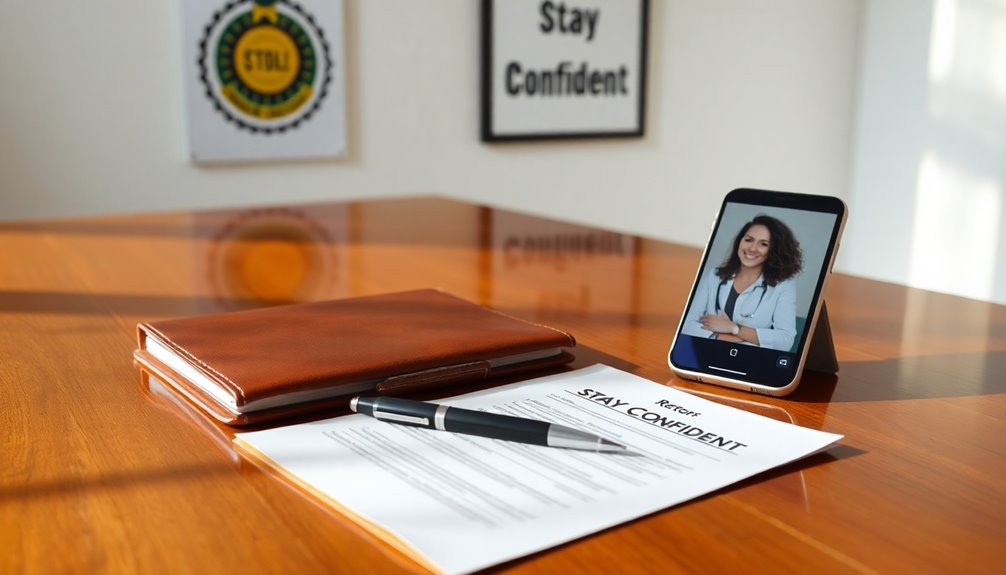To ace your correctional officer interview today, focus on understanding key topics like motivation, stress management, and decision-making. Prepare answers for common questions about your experience with inmates and conflict resolution. Be ready for challenging scenarios that test your problem-solving skills, especially in emergencies. Highlight your commitment to safety and your physical fitness routine. Clear communication is essential, so practice maintaining eye contact and confident expression. By showcasing your strengths and relevant examples, you'll demonstrate readiness for the role. Discovering more strategies can further enhance your chances of success in this competitive field.
Key Takeaways
- Prepare to discuss your motivation for becoming a correctional officer, focusing on rehabilitation and public safety.
- Highlight your experience with conflict resolution and your ability to handle difficult situations calmly.
- Demonstrate your physical fitness routine and commitment to maintaining a healthy lifestyle.
- Practice articulating your thought processes for hypothetical scenarios to showcase your problem-solving skills.
- Emphasize your dedication to safety, professionalism, and ethical decision-making in all interactions.
Common Interview Questions

During your correctional officer interview, you'll likely face a range of common questions designed to gauge your motivation, stress management skills, and personal strengths.
Expect inquiries about why you want to become a correctional officer; your answer should reflect genuine interest in the role. You'll also encounter questions on how you handle stress—be ready to share specific coping strategies after long shifts.
Interviewers may ask about your personal strengths, so think about traits like integrity and resilience that benefit the job. Additionally, be prepared for questions on your physical fitness and how you maintain it, as well as ethical dilemmas that assess your decision-making skills.
Your responses will reveal your readiness for this challenging position.
Assessing Your Experience

Your experience plays a significant role in shaping your suitability for the correctional officer position. Reflect on your past interactions with inmates, any law enforcement background, and how you've handled conflict. Highlight specific situations where your skills shone through. Additionally, understanding the importance of emotional and psychological support can enhance your ability to engage effectively with inmates during challenging situations.
Here's a table to help you assess the emotional impact of your experiences:
| Experience Type | Emotional Impact |
|---|---|
| Working with Inmates | Empathy and understanding |
| Conflict Resolution | Confidence and resilience |
| Routine Management | Reliability and diligence |
| Law Enforcement Background | Authority and respect |
Challenging Situational Questions

Facing challenging situational questions in a correctional officer interview can be intimidating, but they're vital for demonstrating your problem-solving abilities and decision-making skills.
These questions often present hypothetical scenarios where you'll need to think on your feet. You'll be asked how you'd handle conflicts between inmates or respond to emergencies.
It's important to articulate your thought process clearly, showing your ability to assess risks quickly and make sound judgments. Remember, interviewers want to see how you prioritize safety while effectively managing difficult dynamics.
Prepare by reflecting on past experiences where you navigated challenges successfully, as this will help you provide concrete examples that highlight your readiness for the role.
Stay calm, think critically, and showcase your skills.
Sample Responses to Questions

Crafting effective responses to interview questions is essential for showcasing your qualifications as a correctional officer.
When asked about conflict resolution, you might say, "In a past situation, I mediated a disagreement between inmates by actively listening and finding common ground, ensuring everyone's safety."
If questioned about your motivation, you could respond, "I believe in rehabilitation and want to contribute to a safe environment for both staff and inmates."
For physical fitness inquiries, state, "I maintain a regular workout routine to stay fit and ready for the demands of the job."
Always focus on specific examples that highlight your skills and commitment, demonstrating your readiness for the responsibilities of a correctional officer.
Effective Interview Strategies

To stand out in a correctional officer interview, applying effective strategies can make a significant difference. Focus on clear communication, showcasing your relevant experiences, and demonstrating problem-solving skills. Prepare for common questions by practicing your responses, emphasizing your commitment to safety and professionalism.
| Strategy | Description | Example |
|---|---|---|
| Clear Communication | Speak confidently and clearly. | Maintain eye contact. |
| Relevant Experience | Highlight past roles that relate to the job. | Discuss volunteer work in a correctional setting. |
| Problem-Solving Skills | Share examples of handling difficult situations. | Explain a conflict resolution scenario. |
Frequently Asked Questions
What Qualities Make You a Suitable Candidate for This Role?
When considering what qualities make you a suitable candidate for a correctional officer role, think about your strong communication skills and ability to manage stress.
You've likely shown reliability in past experiences and possess a commitment to safety.
Your physical fitness and conflict resolution abilities demonstrate your readiness for the demands of the job.
Additionally, your integrity and ethical decision-making reflect your dedication to maintaining a fair and secure environment for everyone involved.
How Do You Handle Difficult or Uncooperative Inmates?
When you handle difficult or uncooperative inmates, you stay calm and assertive.
You use active listening to understand their concerns and de-escalate tensions.
You set clear boundaries while maintaining respect, which helps build rapport.
If needed, you involve your team to guarantee safety and manage the situation effectively.
Your focus on communication and empathy allows you to turn challenging interactions into opportunities for constructive dialogue, ultimately fostering a safer environment.
What Motivates You to Work in a Correctional Facility?
When you think about what motivates you to work in a correctional facility, consider your passion for making a difference.
You're drawn to the idea of rehabilitation and helping individuals turn their lives around. You value safety and believe in maintaining order while treating everyone with respect.
Your desire to contribute to a structured environment, along with your commitment to teamwork, inspires you to pursue this challenging yet rewarding career.
How Do You Maintain Professionalism in Stressful Situations?
Maintaining professionalism in stressful situations requires you to stay calm and focused. You can practice deep breathing techniques to manage anxiety and remind yourself of your training.
When conflicts arise, you should prioritize communication and de-escalation, treating everyone with respect. It's crucial to set a positive example for others, showing that you can handle pressure while remaining fair and composed.
Regular self-reflection on your actions also helps you improve continuously.
What Do You Know About Our Facility's Policies and Procedures?
You might find it interesting that knowing a facility's policies and procedures is essential for success.
When you're familiar with protocols around inmate care, safety measures, and emergency responses, you're better equipped to handle daily challenges.
Make sure you've reviewed the facility's handbook or website beforehand.
This knowledge shows your commitment to professionalism and safety, and it can help you build rapport with your future colleagues and contribute positively to the environment.
Conclusion
By preparing thoroughly for your correctional officer interview, you're like a skilled navigator charting a course through a stormy sea. Just as a navigator relies on their tools and knowledge to steer a ship safely, your preparation will guide you through challenging questions and help you showcase your strengths. Remember, each question is an opportunity to demonstrate your commitment and readiness. With the right mindset and strategies, you'll confidently sail into your future career in corrections.









